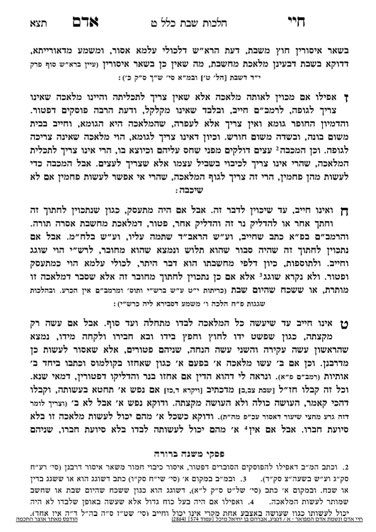We are continuing in siman 8, discussing the concept of misaseik. We left off with a question regarding when the eruv is down and whether one must inform others that the eruv is down, or are those who carry unknowingly considered misaseik.
Rav Moshe Feinstein and Rav Ahron Kotler bring a proof to this question from the same case. The Gemara says that when tzitzis are kosher, they enhance the garment and are considered an extension of the garment. Therefore, it is not considered carrying when a person wears a garment with tzitzis on it. However, if one of the tzitzis tore, and the person is no longer yotzei the mitzvah of tzitzis, the remaining three tzitzis are not doing anything for the garment, so the person is considered carrying.
Similarly, if a person has an item on a garment which is broken but insignificant, such as a broken loop, if they have no intent to fix it, it is not chashuv and therefore batel to the garment. However, if they plan to fix it, it is considered chashuv and no longer batel to the garment. Therefore, it is considered something carried separate from the garment and it would be assur to carry.
The Gemara tells a story with Mar Bar Rav Ashi and Ravina. Mar Bar Rav Ashi was walking on Shabbos and wearing a tallis as clothing. One of the tzitzis tore but he did not notice. Ravina was walking behind him and noticed that it tore. The Gemara gets involved in the question of whether Ravina must inform Mar Bar Rav Ashi that it tore, or he should wait in order to avoid an issue of kavod habriyos. This garment was Mar Bar Rav Ashi’s primary garment, so if he were to remove it, he would have to walk home without clothing (other than presumed undergarments). Similarly, the Gemara connects this to whether a person who knows someone else is wearing pants with kilayim should inform them immediately, or whether they should wait until there is no issue of kavod habriyos.
The Gemara discusses this question at length, and, at one point, the Gemara says that Ravina did inform Mar Bar Rav Ashi due to the issue of carrying on Shabbos. Regarding the mitzvah of tztzis, the meforshim explain that tzitzis is a mitzvas asei, and tzitzis cannot be strung on Shabbos. Therefore, there is no aveirah to wear a garment without tzitzis, so the person is considered an oneiss.
We see from the Gemara that Ravina informs Mar Bar Rav Ashi, and it would appear that it is because one is chayav to inform a person who is carrying, even though they are a misaseik. Rav Moshe and Rav Ahron conclude that the minhag Yisroel is to inform people when the eruv is down, in order to prevent carrying.
It is said over in the name of the Brisker Rav that one does not need to inform others, since it is misaseik, but we see a strong indication from this Gemara that one needs to inform.
If a person forgets the light is on in the refrigerator and opens the door, they had no intent to turn on the light. It could be argued that it is akin to a case of misaseik, since the person opened the door thinking that it was muttar to open it. Based on this Gemara, if Reuvein is aware the light was left on, he cannot ask Shimon, who is not aware, to open the door for him. Although Shimon would be a misaseik, because he is under the assumption that the light is open, we see from this Gemara that one cannot rely on this argument and must inform the person even if they would otherwise be misaseik. We will discuss this case further, be’ezras Hashem.
Summary
- Misaseik is applied when one is unaware of the action they are performing.
- Misaseik is assur miderabanan, and therefore one is chayav to take steps to prevent a misaseik from occurring. Therefore, one must inform others when the eruv is down.



